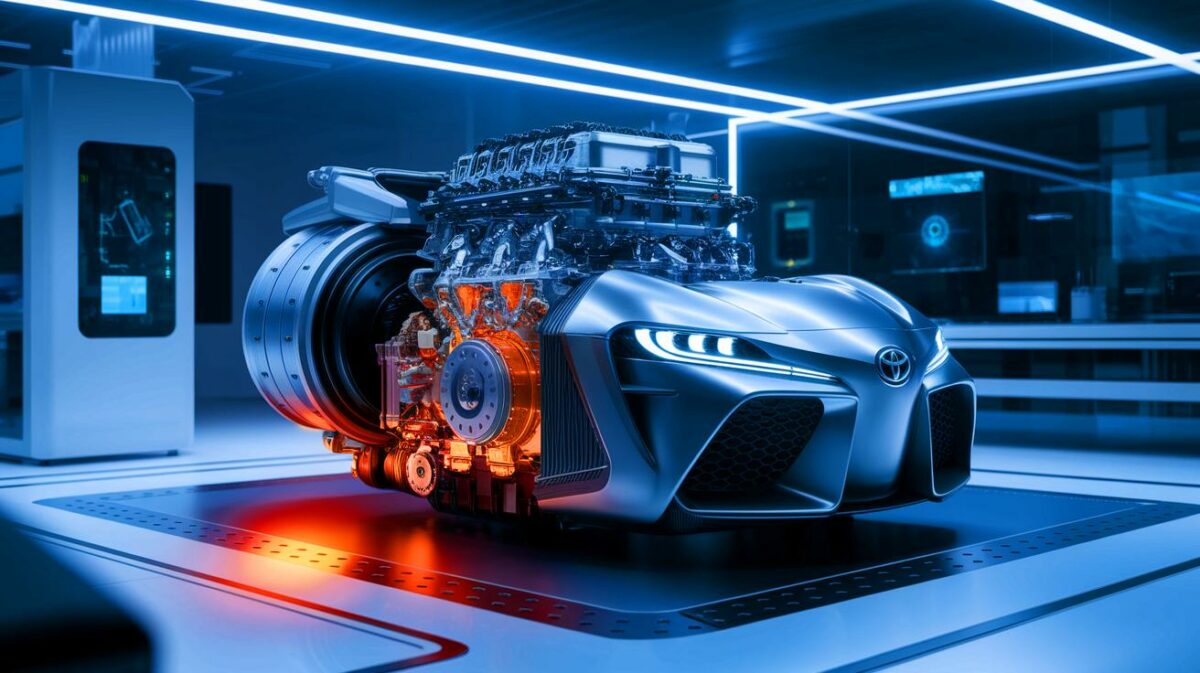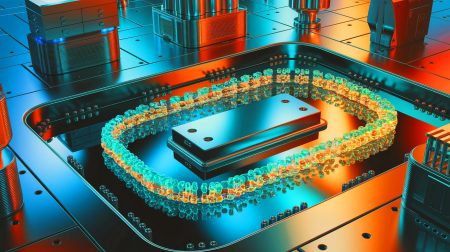| IN A NUTSHELL |
|
Toyota, the renowned Japanese automotive giant, has introduced a groundbreaking innovation that could potentially disrupt the automotive industry. This engine, which operates without gasoline or electricity, has sparked significant curiosity. However, this advancement brings to light an unexpected challenge associated with the use of ammonia, a substance with complex properties. As the automotive world seeks sustainable alternatives, Toyota’s bold move presents both promise and challenges.
The Ammonia-Powered Engine: An Unexpected Revolution
In a market where alternative solutions to fossil fuels are rapidly increasing, Toyota has taken an unexpected path. While electricity and batteries appear to be the preferred choice for many manufacturers, Toyota, in collaboration with its Chinese partner GAC Motor, has decided to focus on ammonia. This unprecedented engine, running on ammonia, stands out by eliminating the need for gasoline, electricity, or even hydrogen. Though unconventional, ammonia could offer a viable alternative in the quest for energy transition.
Ammonia, known for its pungent odor and colorlessness, is being reimagined as a fuel source. This innovation might redefine how we think about alternative fuels, potentially leading to a new era in automotive engineering. However, embracing ammonia as a fuel raises several questions about its practicality and impact on the environment.
Technical and Health Challenges
Ammonia (NH3) is a well-known chemical compound recognized for its potential hazards. Colorless and highly irritating, it emits a sharp odor even at low concentrations. At higher levels, it can become toxic, posing significant health risks. Traditionally used in industries to produce fertilizers, explosives, and refrigeration, its application in automobiles presents new challenges. Managing its odor and toxicity in vehicles is a major hurdle that Toyota must overcome to achieve widespread adoption.
The development of vehicles powered by ammonia introduces concerns about passenger safety and environmental impact. Toyota’s engineers are tasked with finding solutions to mitigate these risks, ensuring that the benefits of ammonia do not come at the expense of public health. This endeavor will require innovative approaches to engineering and stringent safety measures.
Economic and Geopolitical Implications
Adopting this engine would necessitate significant economic changes. New infrastructures must be developed to produce and distribute ammonia on a large scale. This presents a substantial challenge but also an opportunity to repurpose existing thermal engines. Another obstacle lies in ammonia production, with Europe producing very little, except for Germany. China, Russia, and the United States dominate the market. The risk of dependence on these countries for ammonia supply is a real concern and must be addressed.
| 🚗 Innovative Engine | Uses ammonia instead of gasoline or electricity |
| ⚠️ Health Challenges | Odor and toxicity of ammonia pose issues |
| 🌍 Geopolitical Dependence | Ammonia production concentrated in few countries |
These economic and geopolitical factors play a crucial role in determining the feasibility of ammonia-powered vehicles. Overcoming these barriers will be key to securing a sustainable future for this technology.
Toward a Diversified Energy Future
Despite the obstacles, Toyota’s innovation could signify a turning point in the search for alternative energy solutions. Reducing greenhouse gas emissions remains a priority, but it must not come at the cost of public health or energy sovereignty. The success of this technology will depend on the ability to mitigate the drawbacks of ammonia, including developing methods to neutralize its odor and reduce its toxicity while ensuring sustainable production.
Diverse solutions are essential for a clean energy future. The question remains whether Toyota can overcome these challenges and bring this innovation to market. Will the future of automobiles be characterized by the scent of ammonia?
As we look forward to the potential of ammonia-powered vehicles, we must consider how this technology will fit into the broader landscape of sustainable energy solutions. What measures will be taken to ensure its safety and viability, and how will it impact the global automotive industry? The journey toward a greener future is full of possibilities and challenges, sparking curiosity about the next developments in this exciting field.
Did you like it? 4.5/5 (21)









Wow, an engine that doesn’t use gas or electricity? That’s incredible! 🚗💡
Ammonia? Isn’t that the stuff that smells really bad? How will they manage the odor in cars?
This sounds like a sci-fi movie plot! When can we expect to see these on the road?
Thank you, Toyota, for pushing the boundaries of what’s possible. Can’t wait to see where this goes!
I’m skeptical. Ammonia is toxic, right? How safe can this really be?
Great innovation, but what about the infrastructure? Is there any plan to build ammonia stations?
As if the world wasn’t complicated enough, now we have to worry about ammonia production too? 😂
How efficient is this compared to electric vehicles? Curious to see the numbers!
Ammonia-powered cars… sounds smelly! 😅
Toyota is always ahead of the curve. Bold move!
Thank you for the article! Appreciate the insights into new automotive tech. 🙏
Does this mean Toyota’s giving up on electric vehicles entirely?
Imagine driving a car that smells like a cleaning product factory. No thanks! 🤢
What’s the environmental impact of ammonia production compared to fossil fuels?
Could this technology be adapted for other applications, like aviation or shipping?
Sounds promising, but how will Toyota address the toxicity issue? Health comes first.
Finally, a new direction for sustainable energy! Hope it works out. 🌍
Is this just a publicity stunt, or is it actually feasible?
With ammonia being so toxic, what are the safety measures planned for these engines?
I’m all for innovation, but this seems risky. 🤔
Ammonia is a bold choice. I hope Toyota has thought this through!
How does this compare with hydrogen fuel cells? Is ammonia more efficient?
The future smells… adventurous? Can’t wait to see how this pans out! 🌟
Will my car insurance cover ammonia-related incidents? 😂
Is the ammonia used in these engines renewable?
Engine without gas or electricity? Magic or science? 🔮
Thank you for highlighting the geopolitical concerns. It’s an important aspect to consider.
Is this engine already in testing, or is it just a concept for now?
Ammonia—never thought I’d hear that in a car context! Toyota is really thinking outside the box.
How soon until these cars hit the market? I’m intrigued!
Not sure how I feel about relying on ammonia-producing countries. Sounds like a geopolitical mess.
Great article! This is the kind of innovation we need to combat climate change. 🌱
Will this engine work in extreme climates? Like very cold or hot regions?
How will Toyota address public perception of ammonia’s toxicity? 🤔
Thank you for the detailed overview! Excited to see the next steps in this journey.